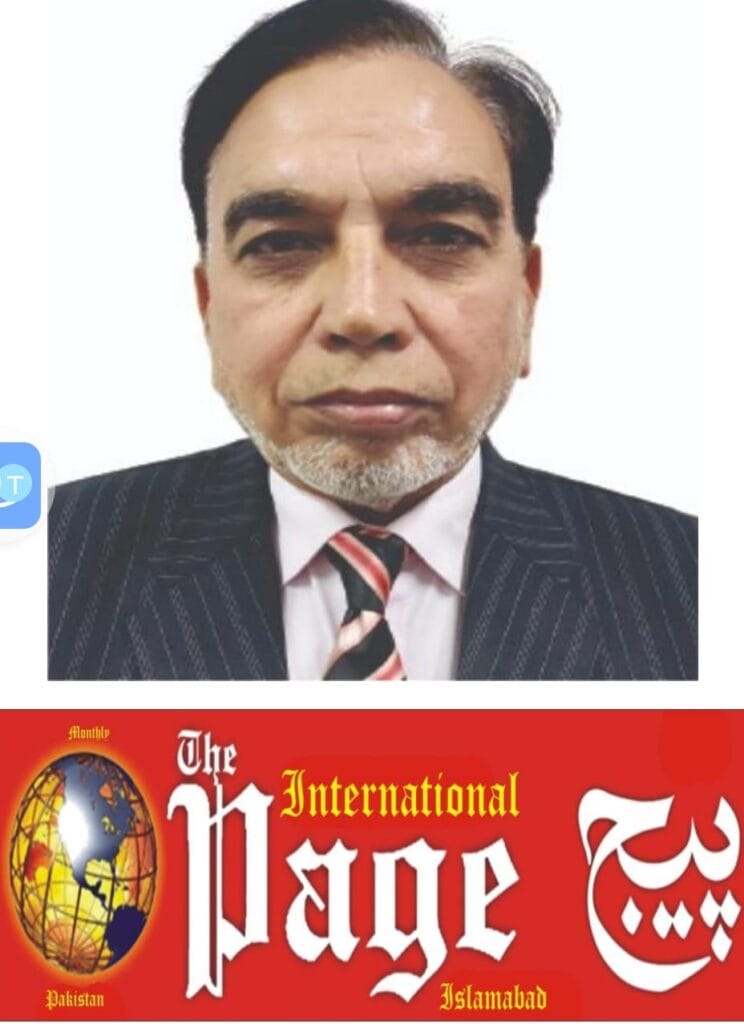Report: Emergency Meeting of the National Security Committee on India’s Hostile Actions against Pakistan
التقرير الدبلوماسي: اجتماع لجنة الأمن القومي حول الأعمال العدائية الهندية ضد باكستان
Date: April 2025
Location: Islamabad


Rasheed Ahmad Chughtai
www.rachughtai.com
In response to a series of escalating provocations from the Republic of India—particularly in the wake of the Pahalgam incident and the unilateral suspension of the Indus Waters Treaty—the Government of Pakistan convened an emergency session of the National Security Committee (NSC) under the chairmanship of Prime Minister Muhammad Shehbaz Sharif. The meeting was attended by senior civil and military leadership, including the Chief of Army Staff, the Foreign Minister, the Defence Minister, and National Security Adviser.
1. Rejection of India’s Suspension of the Indus Waters Treaty
The NSC categorically rejected India’s unilateral suspension of the 1960 Indus Waters Treaty, which was brokered by the World Bank and has served as a cornerstone of regional water cooperation for over six decades. The Committee emphasized that any disruption to Pakistan’s rightful share of water under international law would be interpreted as an act of aggression and a declaration of war.
2. Suspension of Diplomatic and Trade Engagements
*The following immediate measures were approved:*
Complete closure of all land routes, including the Wagah Border, for the movement of goods and people to and from India.
Immediate suspension of all airspace access to Indian commercial and military aircraft.
Termination of all trade activities with India, including those via third countries.
Reduction of diplomatic presence: India’s diplomatic staff in Islamabad will be reduced to 30 by April 30, 2025.
Declaration of Indian military attachés as persona non grata, with orders to leave Pakistan by April 30.
Revocation of all SAARC visa exemptions for Indian citizens, with a 48-hour deadline to exit Pakistani territory. Sikh pilgrims already present will be exempted on humanitarian grounds.
3. Diplomatic Retaliation and Warning
Pakistan has suspended all bilateral agreements, including the Simla Agreement, until India complies with:
UN Security Council Resolutions on Jammu and Kashmir.
Ceasing all covert and overt support to terrorist groups operating in Pakistan, including the BLA and TTP.
The NSC stressed that any further hostile act by India will be met with full-spectrum national retaliation. The Defence Minister warned:
“If Indian aggression targets Pakistani civilians, India must be prepared for identical responses within its own cities.”
4. Foreign Ministry’s Stance and Intelligence Findings
Deputy Prime Minister and Foreign Minister Ishaq Dar revealed:
India failed to mention suspension of the Indus Waters Treaty in its official demarche.
Evidence exists that heavily armed foreign elements, supported by Indian intelligence, infiltrated Srinagar to orchestrate the Pahalgam incident.
The Foreign Office will summon the Indian High Commissioner and reciprocate all diplomatic downgrades initiated by India.
5. National Security and Military Preparedness
The Armed Forces of Pakistan remain on highest alert, fully capable of defending every inch of national territory. Referring to the 2019 Balakot standoff, the NSC reaffirmed: “Pakistan’s response will surpass all previous retaliations if provoked.”
The Defence Minister added:
India is actively engaged in hybrid warfare and sponsors terrorism across borders.
Kulbhushan Jadhav remains undeniable proof of India’s state-sponsored terrorism.
6. Kashmir and Ideological Assertion
The NSC reiterated that India’s actions:
Validate the Two-Nation Theory.
Confirm the foresight of Quaid-e-Azam Muhammad Ali Jinnah.
Highlight the continued illegal occupation of Jammu and Kashmir as a violation of international law and human rights.
Rasheed Ahmad Chughtai
www.rachughtai.com
التقرير الدبلوماسي: اجتماع لجنة الأمن القومي حول الأعمال العدائية الهندية ضد باكستان
التاريخ: أبريل 2025
المكان: إسلام آباد
عقدت حكومة باكستان اجتماعاً طارئاً للجنة الأمن القومي برئاسة رئيس الوزراء محمد شهباز شريف، بحضور كبار القادة المدنيين والعسكريين، وذلك رداً على التصعيد الهندي الخطير، ولا سيما بعد حادثة “باهلجام” وقرار الهند الأحادي بتعليق معاهدة مياه السند.
١. رفض باكستان لتعليق معاهدة مياه السند
رفضت اللجنة بشكل قاطع تعليق الهند الأحادي لمعاهدة مياه السند الموقعة عام 1960 برعاية البنك الدولي، واعتبرت أن أي محاولة لقطع أو تحويل مياه الأنهار المخصصة لباكستان ستُعد عملاً عدائياً وإعلان حرب.
٢. تعليق العلاقات التجارية والدبلوماسية
أقرت اللجنة الإجراءات التالية:
إغلاق جميع المنافذ البرية مع الهند، بما في ذلك معبر واهغا، أمام حركة البضائع والأفراد.
منع دخول الطائرات الهندية، المدنية والعسكرية، إلى المجال الجوي الباكستاني.
تعليق جميع الأنشطة التجارية مع الهند بشكل مباشر أو عبر أطراف ثالثة.
تخفيض التمثيل الدبلوماسي الهندي في إسلام آباد إلى 30 شخصاً فقط، بدءاً من 30 أبريل.
إعلان الملحقين العسكريين الهنود أشخاصاً غير مرغوب بهم، ومطالبتهم بمغادرة البلاد في موعد أقصاه 30 أبريل.
إلغاء إعفاءات تأشيرة السفر ضمن اتفاقية “سارك” للمواطنين الهنود، مع مهلة 48 ساعة لمغادرة باكستان، باستثناء الحجاج السيخ.
٣. الرد الدبلوماسي والتحذيرات
قررت باكستان تعليق جميع الاتفاقات الثنائية، بما في ذلك اتفاقية سيملا، إلى حين:
امتثال الهند لقرارات مجلس الأمن بشأن كشمير.
وقف دعمها الممنهج للإرهاب ضد باكستان، خاصة عبر جماعات “BLA” و”TTP”.
وأكدت اللجنة أن أي اعتداء هندي إضافي سيقابل برد كامل وشامل من الدولة الباكستانية. وحذر وزير الدفاع قائلاً:
“إذا استهدفت الهند المدنيين الباكستانيين، فسوف نرد بالمثل داخل المدن الهندية.”
٤. موقف وزارة الخارجية والاستخبارات
كشف وزير الخارجية إسحاق دار أن:
الهند لم تشر في مذكرتها الرسمية إلى تعليق معاهدة مياه السند.
هناك أدلة على دخول عناصر مسلحة أجانب إلى سريناجار بتسهيلات من الاستخبارات الهندية.
وزارة الخارجية ستستدعي المفوض الهندي اليوم وتنفذ إجراءات متطابقة.
٥. الاستعدادات العسكرية والأمنية
أكدت القوات المسلحة الباكستانية أنها في أقصى درجات التأهب، وأنها مستعدة لحماية السيادة الوطنية بكل قوة، وأشارت اللجنة إلى الرد الحاسم خلال العدوان الهندي في فبراير 2019.
وقال وزير الدفاع:
الهند تمارس حرباً هجينة وتدعم الإرهاب.
كلبوشن جاداف هو دليل حي على الإرهاب الذي تمارسه الدولة الهندية.
٦. كشمير والتأكيد على أساس باكستان العقائدي
شددت اللجنة على أن التصرفات الهندية:
تعزز نظرية الدولتين.
تؤكد بُعد نظر القائد المؤسس محمد علي جناح.
تفضح استمرار الاحتلال غير القانوني لكشمير، وانتهاك القوانين الدولية.
رشید احمد چغتائی
www.rachughtai.com


